2025 National Invasive Species Webinar Series
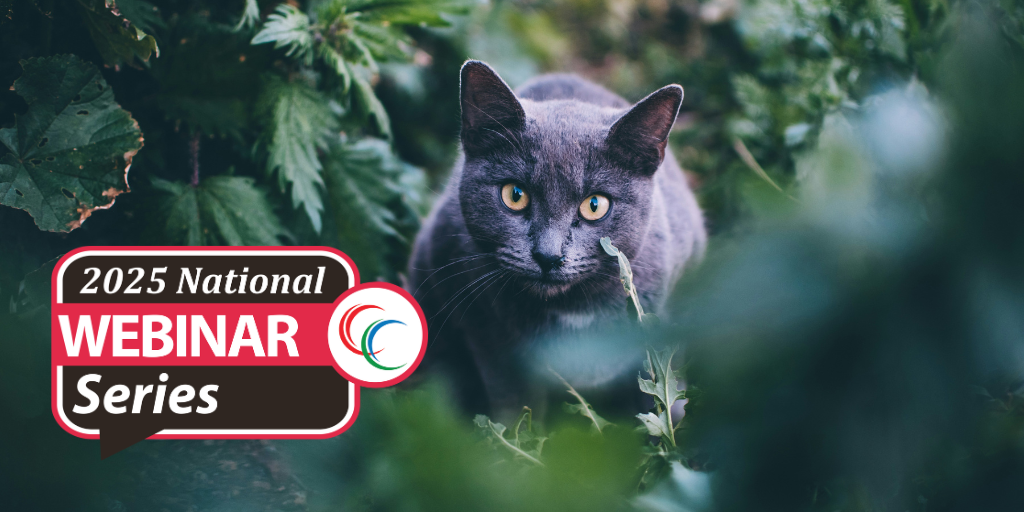
This March, the Canadian Council on Invasive Species will be hosting our annual Webinar Series!
As part of Canada’s Invasive Species Awareness Week (February 24 – March 2), CCIS is working to increase awareness about invasive species in Canada through our annual webinar series. This series will bring together experts, researchers, and partners to highlight impactful projects, new research and upcoming threats that are shaping the landscape of invasive species action across Canada. This year’s presentations include:
-
Leveraging Behaviour Change Principles to Support Prevention of Invasive Species (Wednesday, March 5th)
-
On the Edge of Invasion (Monday, March 10th)
-
Invasive Management: New and Alternative Tools in the Toolbox (Wednesday, March 19th)
-
Strategies to Prevent the Impact of Free-Range Domestic Cats (Wednesday, March 26th)
-
Invasive Wild Pigs: Collaborative Management Efforts in British Columbia (Thursday, March 27th)
-
To Catch a Killer: Eradication of the Asian Giant Hornet in the US (Monday, March 31st)
Registration Details and Links Below!
Stay tuned as we announce new topics and details about speakers and presentations.
You can support our work, like our annual webinar series, to spread the word about invasive species; eliminate the pathways invasive species use to spread in Canada; and protect our ecosystems by making a donation.
Access previous webinar recordings
Subscribe for webinar recording updates

Leveraging Behaviour Change Principles to Support Prevention of Invasive Species
Wednesday, March 5th @ 12:00pm (EST)
Meet the Speaker: Ken Donnelly, President of Beyond Attitude
For more than thirty years, Ken Donnelly has combined research and behavioural psychology to foster positive individual behaviours in environmental conservation. For more than 12 years, his focus has been primarily on the human dimension of invasive species. Ken is a researcher, strategist, trainer, and speaker.
Ken is currently the Supervisor of the Nova Scotia Invasive Species Council and Vice-Chair of the Canadian Council on Invasive Species.
Presentation Description:
Raising awareness and changing attitudes about environmental conservation is important, but it is not enough to move the needle. Learn how to cultivate conservation activity by applying behavioural psychology to education and outreach programs.

On the Edge of Invasion
Monday, March 10th @ 12:00pm (EST)
In regions at the “edge of invasion,” monitoring efforts are crucial for early detection and rapid response. Join us for this session in the CCIS Annual Webinar Series, where experts from Prince Edward Island and Treaty #3 territory will share their unique approaches to monitoring and managing invasive species on the frontlines.
We invite experts from Grand Council Treaty 3 in Ontario and the PEI Invasive Species Council to discuss their work monitoring for invasive Phragmites and Hemlock Woolly Adelgid at the edge of their range or just beyond.
Chase Guindon, Coordinator, PEI Invasive Species Council

Chase is the coordinator of the PEI Invasive Species Council, a nonprofit organization dedicated to preventing the introduction and spread of invasive species island wide. Chase is based out of Charlottetown, but was born and raised in southern Ontario where he spent several years working for the OFAH Invading Species Awareness Program.
Presentation Description:
As an Island, PEI is uniquely insulated from the natural spread of invasive species by the Northumberland Strait which separates it from the mainland. Chase Guindon, PEI Invasive Species Council coordinator, will discuss their approach to the early detection of invasive species moving closer along the Atlantic coast.
Chris Herc, Environmental Manager, Grand Council Treaty #3
Chris Herc is originally from New Brunswick but has lived and worked across Canada before settling into his role as Environmental Manager with Grand Council Treaty #3. Through his work at Grand Council Treaty #3 Chris works with the 28 Treaty #3 communities on long-term water quality monitoring, community-based climate impacts monitoring, invasive species management, and species at risk conservation to build and strengthen capacity for Indigenous led stewardship and protection of the lands, waters, and relations in Treaty #3. Chris has a B.Sc. in Environmental and Natural Resources with over ten years’ experience and has worked across Canada in the environmental conservation field. He is always excited to work with the Treaty #3 communities to build and strengthen environmental conservation and protection initiatives and partnerships for the Nation.
Presentation Description:
Invasive Species Early Detection and Management in Treaty #3: From setting a mandate to monitoring, mapping and management Grand Council Treaty #3 will highlight challenges and solutions for invasive species management in the often “forgotten about” areas of Canada.

Invasives Management: New and Alternative Tools in the Toolbox
Wednesday, March 19th @ 12:00pm (EST)
Three presenters will discuss alternative methods and upcoming technology being used towards monitoring and managing invasive species.
Cheryl Post, Natural Environment Specialist, City of Toronto – Urban Forestry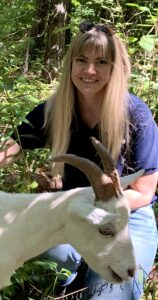
Cheryl Post is a Natural Environment Specialist with the City of Toronto, Urban Forestry. For over a decade she has specialized in natural environment infrastructure projects that protect and enhance Toronto’s urban ecology, such as wetlands, boardwalks, and sustainable trails. She recently spearheaded Toronto’s innovative Prescribed Grazing Project, the first to pilot this type of grazing for urban ecosystem management in Ontario.
Toronto’s Prescribed Goat Grazing Pilot – A First for Urban Ecosystem Management
In 2024, the City of Toronto (Urban Forestry) became the first municipality in Ontario to launch a comprehensive goat grazing program to address invasive species and enhance habitat diversity. The Prescribed Grazing Pilot Project was a significant success story, bringing over 60 goats to graze 3000 m2 of meadow habitat at Don Valley Brick Works Park. Prescribed grazing can address a variety of management concerns, including invasive species, woody vegetation encroachment, native plant regeneration, and soil improvement. It also provides ample opportunity for engagement and education. The City of Toronto is excited to be at the forefront of grazing in Ontario. Join us to learn more about the project, and this exciting and innovative approach to urban ecosystem management.
Paige Kuczmarski, Biocontrol Coordinator, Alberta Invasive Species Council
Paige graduated in 2017 with a Bachelor’s degree in Biological Sciences from MacEwan University where she was first introduced to invasive species through efforts with multiple research projects with garlic mustard and forest tent caterpillars. Soon after, she started various positions with Alberta Agriculture and Alberta Environment and Parks over the next four years. In 2021, she joined the AISC as their ‘Jill’ of all trades, running the Biocontrol Release Program, increasing the AISC’s social media presence and general invasive species projects! She continues to foster her love of the outdoors within this role and hopes to assist in educating Albertans on invasive species and their management.
Biocontrol in Action: AISC’s History and Tools
Join the Alberta Invasive Species Council (AISC) for a look at the evolution of its biocontrol program. This webinar will cover the history of biocontrol efforts in Alberta, key tools in AISC’s toolbox, and how these sustainable methods are used to control invasive species while minimizing environmental impact.
Emilia Stepinski, Environmental Engineer and Geospatial Technical Lead, Ramboll
With 14 years of experience in geospatial analytics, remote sensing, and data science and visualization, Emilia’s expertise includes developing AI models for earth observation data analysis, such as habitat classification, invasive species identification, and biodiversity monitoring. As a Geospatial Team Lead, her role is to ensure the continued development of Ramboll’s data analytics capabilities using machine learning and deep learning methods for imagery analysis.
Harnessing the Power of Drones and AI for Efficient Invasive Species Identification and Monitoring
Monitoring and managing invasive plant species is crucial to maintaining biodiversity, but traditional on-to-ground methods can be time-consuming, expensive, and often results in an incomplete picture. Advancements in drone technology and artificial intelligence (AI) offer novel solutions for efficient, comprehensive site-wide analysis.
This presentation will explore how drone imagery, combined with AI-powered imagery analysis can revolutionize the management of invasive plant species. Specifically, we will showcase two case studies focused on identifying Giant Hogweed in the UK and in New York State. These case studies will examine the benefits and drawbacks of using imagery for invasive species monitoring and provide insights into the practical applications and potential limitations.
Furthermore, the presentation will also highlight broader ecological uses for drone imagery and AI analysis, such as biodiversity assessments across large areas. By integrating AI with high-resolution drone imagery, we can conduct detailed analyses that provide a more complete picture of the ecological landscape. Join us to learn about cutting-edge technologies in remote sensing and AI that are transforming ecological monitoring and contributing to more effective environmental management strategies.

Strategies to Prevent the Impact of Free-Range Domestic Cats
Wednesday, March 26th @12:00pm (EST)
**TIME TO BE CONFIRMED AND MAY BE SUBJECT TO CHANGE**
Experts will provide insight into the impacts free-ranging domestic cats have on wildlife and ecosystems, and what agencies and the public can do to mitigate these impacts.
Dr. Elizabeth Gow, Ph.D., Research Scientist, Science and Technology Branch, Environment and Climate Change Canada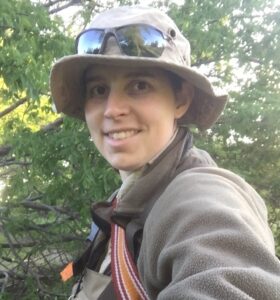
Dr. Elizabeth Gow is a Research Scientist in the Wildlife Research Division at Environment and Climate Change Canada, based out of Delta, BC, and currently an Adjunct Professor at University of Guelph, Simon Fraser University, and McMaster University. Her research incorporates interdisciplinary team approaches and focuses on understanding where, when, and how migratory bird populations are declining. She is a leading expert and researcher on the ecology and behaviour of wandering cats in Canada. Overall, her research team aims to make the world a better place for birds, people and cats.
Challenges surrounding domestic cats and understanding their effects on the environment:
Cats are complex, interesting animals and a popular household pet. Gaining an understanding of what cats do and how they behave outside can help us improve cat quality of life. One of the big debates in cat welfare is whether a cat should be allowed to roam outside. From an ecological perspective the answer is no (because cats are a non-native species), but others think and feel that cats with outdoor access maintain a more fulfilling life and are able to behave in ways more natural to them. Our research aims to understand the how, why and what cats do when they are outside in hopes of helping to solve such debates about the best practices for cat ownership.
Sara H. Schweitzer, Ph.D.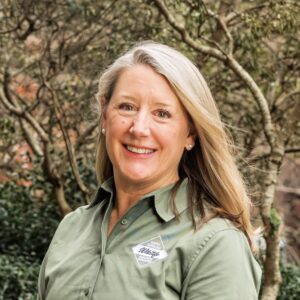
Dr. Sara Schweitzer is the Assistant Chief of the Division of Wildlife Management within the North Carolina Wildlife Resources Commission, and she oversees the Wildlife Diversity Program for the state agency. There are 20 biologists working throughout North Carolina on conservation efforts for birds, mammals, reptiles, and amphibians in her program.
In addition to coordinating surveys, monitoring, research, and habitat conservation projects with her staff and partners, Sara is involved in several partnership programs, including: Bird Conservation, International Relations, and Wildlife Diversity and Funding committees for the Association of Fish and Wildlife Agencies; Atlantic Flyway Council’s Nongame Migratory Bird Technical Section and serves on the Landbird, Raptor, Shorebird, and Waterbird committees, and as the Member-at-Large; Partners in Flight Executive and Steering committees, and the Eastern Working Group; U.S. Shorebird Conservation Plan Council; Waterbird Society’s Conservation Committee and is co-leading work to revitalize the Waterbird Council and update the Waterbird Conservation Initiative’s Plan; IUCN Heron Specialists Group; Wildlife Society and its Southeast Section and North Carolina Chapter; and North Carolina Red Wolf Team.
Presentation Description:
Relative to this webinar, Sara chaired the Feral and Free-Ranging Cat Working Group for the Bird Conservation Committee of AFWA from 2016 to 2022. The WG produced several products that are on its webpage and the Human-Wildlife Interactions Monograph, “Toolkit to Address Free-ranging Domestic Cats on Agency Lands Managed ” by Sara H. Schweitzer and Colin M. Gillin, was published in 2024.

Invasive Wild Pigs: Collaborative Management Efforts in BC
Thursday, March 27th @ 12:00pm (EST)
Meet the Speaker: Emily Lomas, Terrestrial Invasive Fauna Specialist, Ministry of Water, Land and Resource Stewardship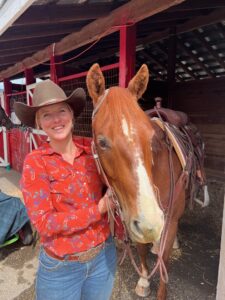
Emily is a wildlife biologist with a BSc from the University of British Columbia and an MSc from Thompson Rivers University, where she studied the effects of human disturbance on the body characteristics and movement patterns of western rattlesnakes in the south Okanagan. She joined the provincial government in 2019 after several years in municipal government and biological consulting. She has worked on a variety of topics with a focus on human-wildlife conflict prevention and conservation issues. Emily is currently focused on mitigating the threats from invasive animals through science-informed policy and action. She is the provincial Early Detection Rapid Response (EDRR) Coordinator for terrestrial animals, supporting the EDRR Advisory Committee, and is also Chair of the American Bullfrog Action Team and the BC Feral Pig Working Group. Emily is based in the beautiful BC Interior, in Tk’emlúps te Secwe̓pemc territory. In her spare time, Emily can be found moseying around her small hobby farm with her dogs and husband, finding more projects to do, or accidentally buying more horses.
Emily Lomas will be discussing the preventative and management work being done to address invasive wild pigs in BC.
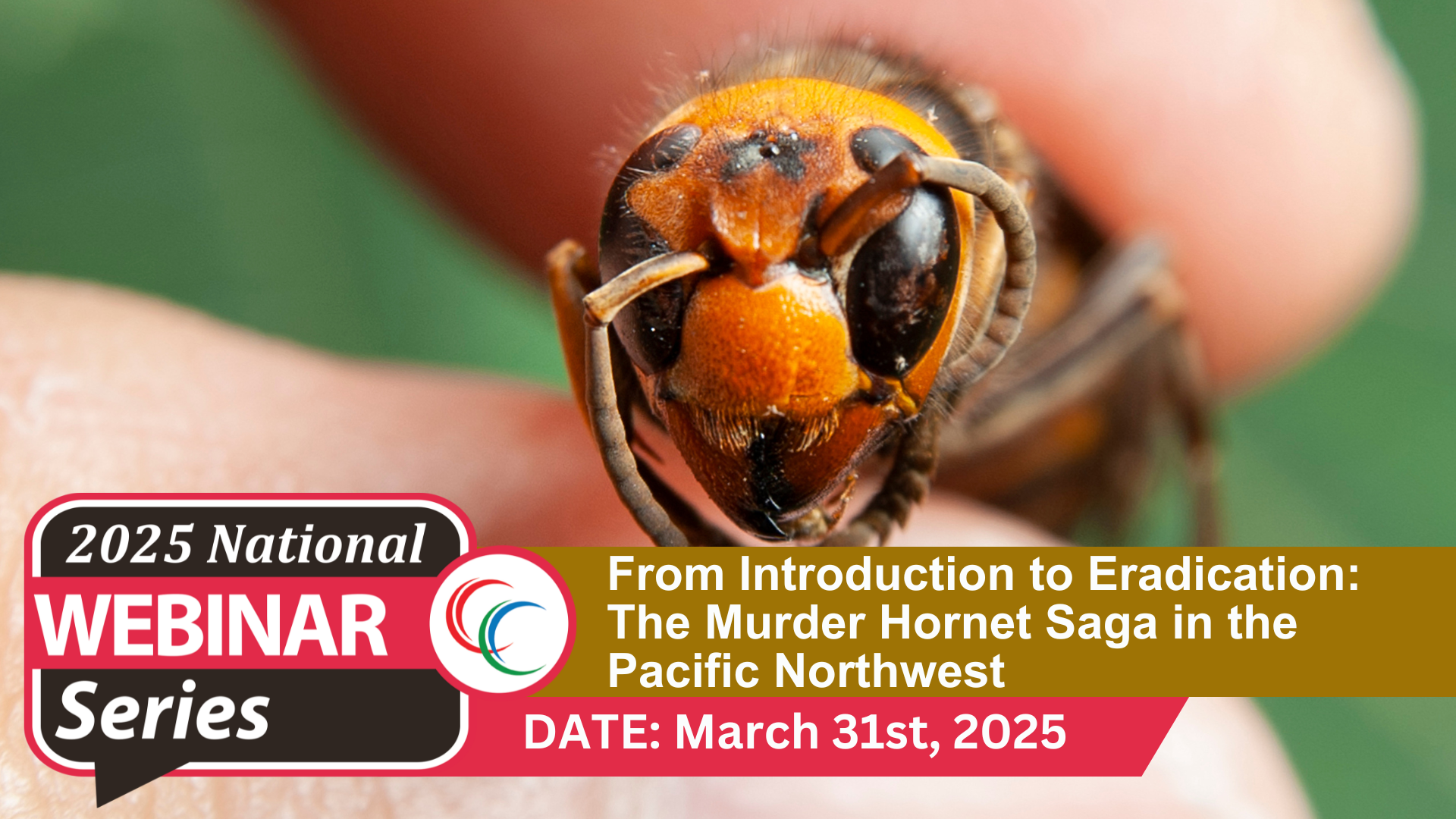
From Introduction to Eradication: The Murder Hornet Saga in the Pacific Northwest
Monday, March 31st @12:00pm (EST)
Meet the Speaker: Chris Looney, Entomologist, Washington State Department of Agriculture – Entomology Laboratory
Chris received an MS in Entomology from Washington State University in 2000, and a PhD in Environmental Science from the University of Idaho in 2007. He became interested in insects as an undergraduate when he realized that there are so many different species that he would never have to work on the same one twice. His graduate work documented insect biodiversity at the Hanford Site and on the Palouse in Washington State. After a stint as a fish biologist in Idaho and as a Customs and Border Protection agent in Washington, he joined the Washington State Department of Agriculture and now manages the WSDA Entomology Laboratory in Olympia, WA. The lab provides identification services for Washington stakeholders, supports exotic pest surveys across the state, and conducts research on exotic insect species and their native relatives. Current lab projects include research on how exotic pest traps impact bee populations, the impact of Bombus impatiens in Cascadia, the biology of giant hornets, and whatever other random thing pops up this year.
“After five years of relentless effort, the northern giant hornet (Vespa mandarinia) has been eradicated from Washington State and the United States.”
During this Webinar Chris will take us through the remarkable journey of how the Northern Giant Hornet was successfully eradicated from the Pacific Northwest, United States. From introduction in 2019, to eradication 5 years later, Chris will highlight the challenges, innovative approaches and collaborative efforts that led to this invasive species victory.